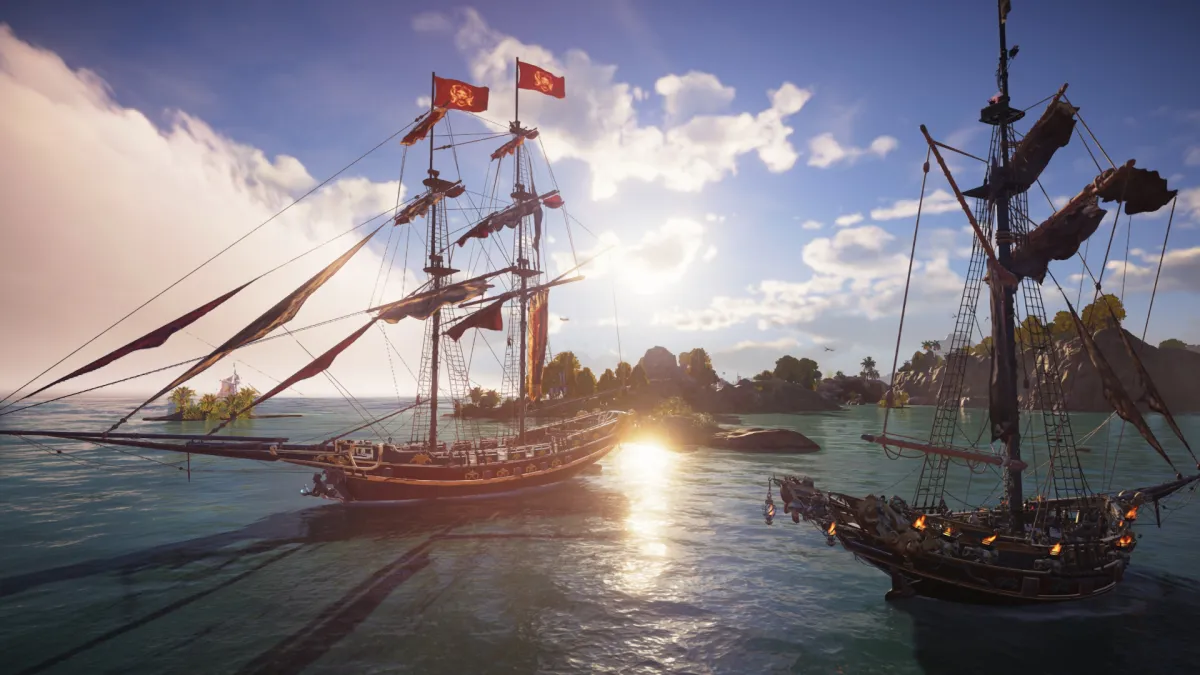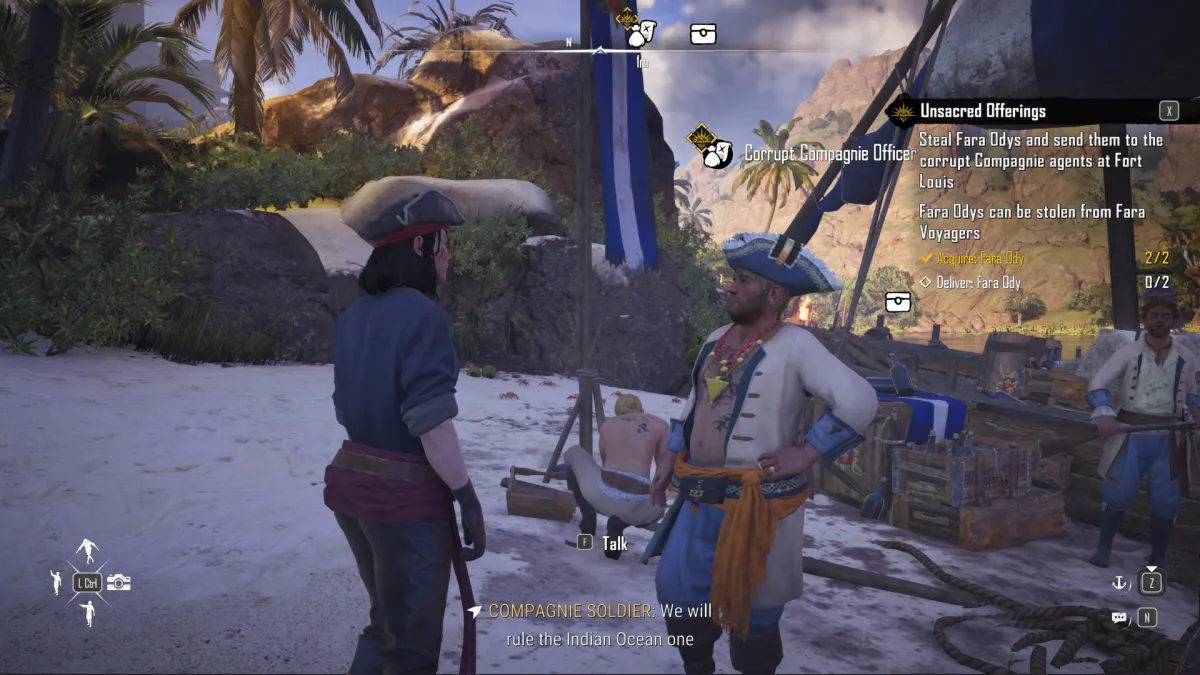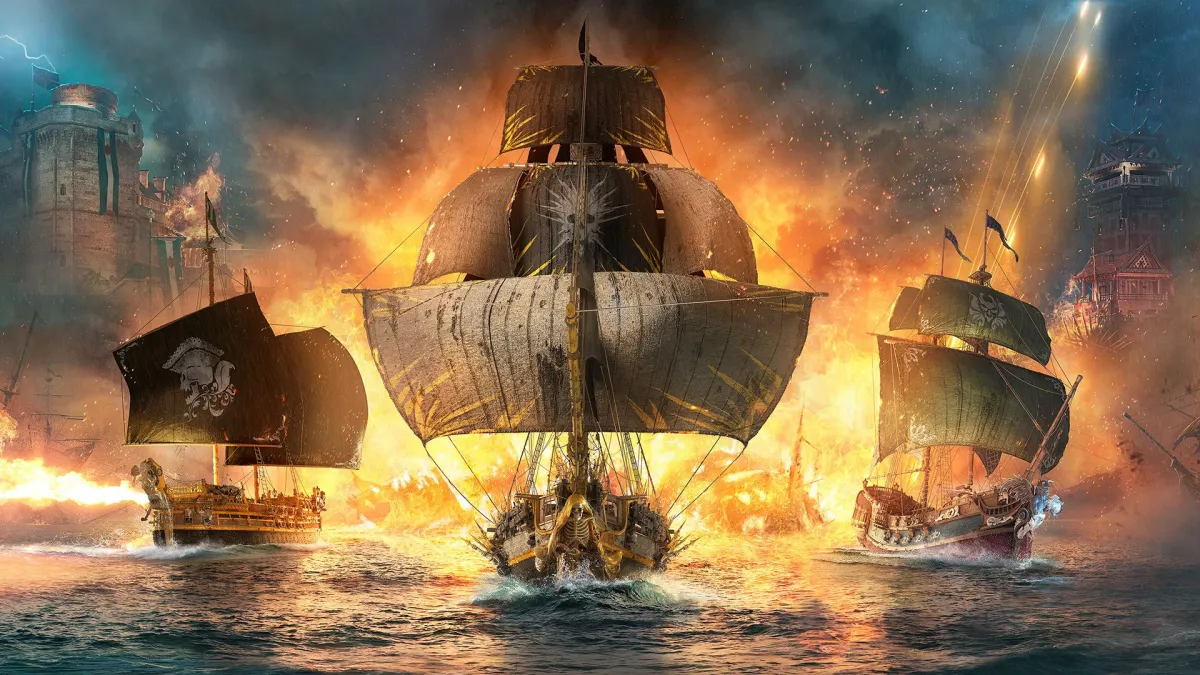Warning: The following article about Skull & Bones contains spoilers.
Ever since I played The Legend of Zelda: The Wind Waker way back in 2004 as a wee lad, I’ve longed for more sailing and pirate-themed adventures. Games like Sid Meier’s Pirates and Assassin’s Creed IV: Black Flag helped assuage that feeling over the years. Given how much I enjoyed the latter, I’ve had cautious optimism for Skull & Bones, Ubisoft’s latest live service game that apes Black Flag’s mechanics, despite the developmental turmoil it has floundered in for about a decade. It’s finally here, and after playing a solid chunk of it, I’m left with little motivation to continue plundering despite satisfying naval battles.
Skull & Bones Gameplay & Overview

Live service games are always structured more around a loop than a traditional linear narrative or something of the sort. For much of Skull & Bones, you’ll be taking contracts from nefarious pirate John Scurlock and later Admiral Rahma. These contracts include sailing out in your ship, sinking a few enemy ships – whether owned by mega-corporations like the French Compagnie Royale and the British Trade Alliance or locals like the Clan of Fara or Ungwana people – before returning to reap the rewards.
In turn, these rewards allow you to craft an increasingly vast array of ships that can hold more cannons, provide higher speeds, have more health, and different abilities while looking pretty darn cool as you also amass customization options. Rinse and repeat until you reach the end game.
Add in plenty of side contracts, and you’ve got a lot of sailing and plundering to do on the open seas. Ubisoft tries to mix up the contracts by, for example, having you raid a coastal outpost as enemies spawn in to stop you or dogging a fleet of ships as you race back to safety with your precious cargo, but even these switch-ups boil down to sailing somewhere, shooting your cannons, and sailing back.
How Much Skull & Bones Did I Play?
I played somewhere around 20 hours of Skull & Bones on PC, both during the open beta and with a review copy provided by Ubisoft after the beta concluded. While I couldn’t gather a group of peers to rule the seas as the connection was frequently shaky, I grouped up with random players to raid and pillage coastal outposts and chase down merchant vessels. Because Skull & Bones is a live service game, you can imagine that I haven’t sniffed much of the end-game, which includes building your own little pirate empire and a sea monster and pirate lord to defeat in raid-like battles.
Related: How to Get Bombardier Padewakang Blueprints in Skull & Bones
The Good

There’s an intensity to some naval battles, especially after the first dozen hours or so, that I looked forward to. Pulling up to a merchant vessel, blowing it full of holes with a close-ranged cannon, before swinging wide to sink it with torpedoes had a satisfying weight to it that never grew old, even if I frequently fought with the controls, crashing into reefs and ramming other ships when I didn’t quite mean to. Once I was a higher level, quickly thrashing smaller vessels made me truly feel like a terror of the seas – especially when doing so brought in a vengeance-seeking frigate or two from the offended faction that I then promptly sunk.
Away from the pirate dens and outposts where your little pirate avatar can wander around on foot, the lush coastlines, rolling teal waves, and threatening storms in the distance all come together to visually provide one of the better sailing experiences in gaming. While I did have a problem with how droll sailing from location to location could get – more on that below – I did appreciate how great it looked. On a 3060ti, I had the Indian Ocean rendered in a crisp 1440p at 144 frames-per-second with settings set to Very High.
The Bad

The foremost complaint I have is that, like many live service games, Skull & Bones has you doing the same thing over and over with little variation after the first few hours: sailing to a certain location to sink an enemy ship or two or plunder a coastal outpost, which also consists of sinking a handful of ships. As much as I enjoyed these high-seas confrontations, there’s no option to slice and dice your way through other pirates or the haughty British naval officers. Instead, boarding opposing vessels consists of a brief cutscene and some extra loot.
The only other significant mechanic is that your pirate can explore about a dozen or so different locales on foot, trading with locals and discovering buried treasure, neither of which adds some much-needed variety to the game. In fact, I dreaded when Skull & Bones forced me off my ship to wander around a small map in search of a buried chest or an NPC to speak with. Some swashbuckling or – I don’t know – undead pirates to flee from would’ve gone a long way toward mixing things up.
This epitomizes a lingering issue that plagued my time with Skull & Bones. As I plundered my way through the Indian Ocean, I couldn’t shake the feeling that it could’ve made for a decent or even great single-player game if development resources were instead used to provide more to do on foot or to flesh out an actually compelling narrative instead of all the thin live service elements.
Who Might Like Skull & Bones?
I imagine if you have a group of friends you game with – and a bottle of rum to keep the sailing from putting you to sleep – you’ll find some fun in Skull & Bones, as the naval battles can get pretty intense. For those that enjoy grindy live service experiences like The Division and Destiny 2, there are definitely worse games to whittle away the hours in than Skull & Bones; that said, I recommend seeing what kind of updates over the next year that Ubisoft puts out before investing both your time and money into this ramshackle pirate adventure.
Skull & Bones is now available on PC, Xbox Series X/S, Xbox One, PS5, and PS4.






Published: Feb 19, 2024 02:30 pm